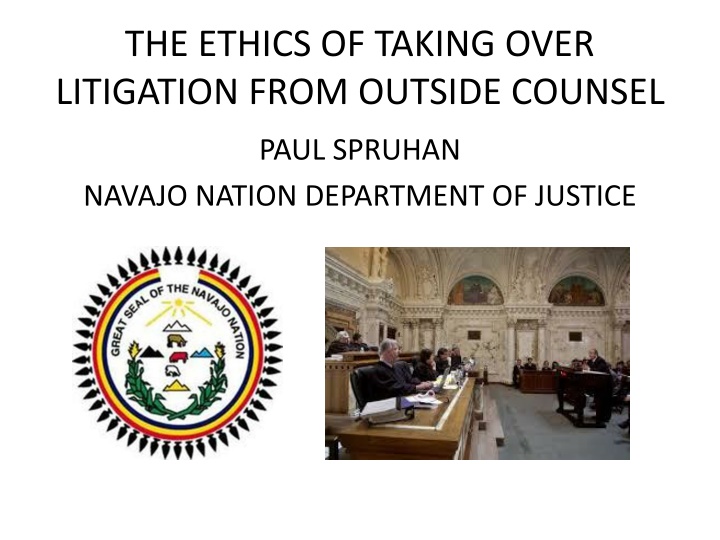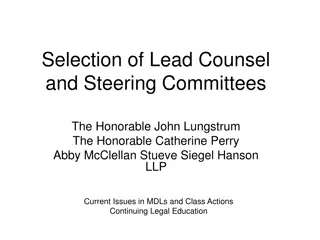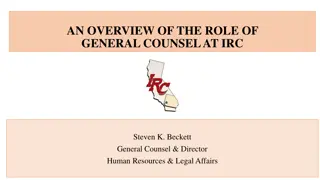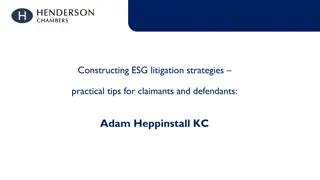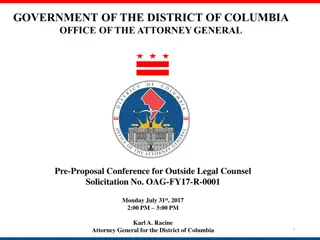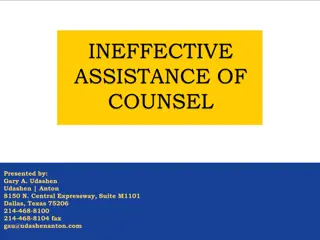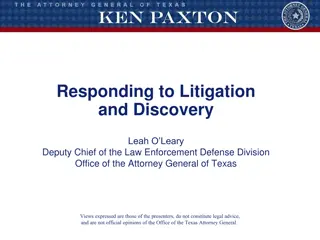Ethics in Litigation Management: In-house vs. Outside Counsel
In the realm of litigation management, the Navajo Nation Department of Justice navigates the complexities of taking over litigation from outside counsel. Delving into the advantages and disadvantages of in-house litigation, the article sheds light on the intricate balance required for effective legal representation. It explores the challenges of technological capacities, the importance of legal support staff, and the timing factors inherent in federal litigation. Additionally, it discusses the nature of federal litigation, highlighting the need for expertise in highly technical rules and the nuances of arguing before judges unfamiliar with Indian law.
Download Presentation

Please find below an Image/Link to download the presentation.
The content on the website is provided AS IS for your information and personal use only. It may not be sold, licensed, or shared on other websites without obtaining consent from the author.If you encounter any issues during the download, it is possible that the publisher has removed the file from their server.
You are allowed to download the files provided on this website for personal or commercial use, subject to the condition that they are used lawfully. All files are the property of their respective owners.
The content on the website is provided AS IS for your information and personal use only. It may not be sold, licensed, or shared on other websites without obtaining consent from the author.
E N D
Presentation Transcript
THE ETHICS OF TAKING OVER LITIGATION FROM OUTSIDE COUNSEL PAUL SPRUHAN NAVAJO NATION DEPARTMENT OF JUSTICE
ADVANTAGES TO IN-HOUSE LITIGATION Can be in more direct contact with clients to receive their views on litigation and positions to be taken (i.e. obligation to communicate) (ABA Rule 1.4) Can save significant amounts of money on hourly billing (ABA Rule 1.5) Can control overall strategy and message of tribe in multiple cases Can involve in-house lawyers in exciting, complex litigation with national impact, potentially improving recruitment and retention
DISADVANTAGES TO IN-HOUSE LITIGATION Technological capacities (e.g., electronic discovery capacity, storage, case law software, conference lines) Lack of Legal support staff (e.g. no paralegals, overworked secretaries; lack of army of associates, discovery departments) Lack of time to concentrate on litigation (Council meetings, emergency matters, requests to show up to meetings and functions) Competency in niche areas of litigation (e.g. trademark, intellectual property, environment; US Supreme Court boutique practice) (ABA Rule 1.1)
TIMING FACTOR Federal litigation takes a looooooooong time Example: Window Rock Unified School Dist. v. Nez Complaint by School District filed: 3/28/12 Federal District Court of Arizona decision: 3/19/13 Ninth Circuit appeal fully briefed: 2/03/14 Oral argument Held: 9/17/15 Decision Issued? WHO KNOWS?
Another Example Navajo Nation v. Urban Outfitters: Complaint filed: 2/28/2012 Multiple summary judgment motions on numerous issues pending Numerous discovery/expert witness motions pending One attempt at interlocutory appeal on sovereign immunity issue No end in sight
NATURE OF FEDERAL LITIGATION Highly technical rules with may pitfalls Having to argue before judges not well-versed in Indian law and buried in other legal issues Generally more sophisticated litigation firms on other side with potentially larger litigation resources and different attitude about discovery battles, etc. Travel and expense to go to far away courts (e.g. San Francisco/Denver for appellate)
